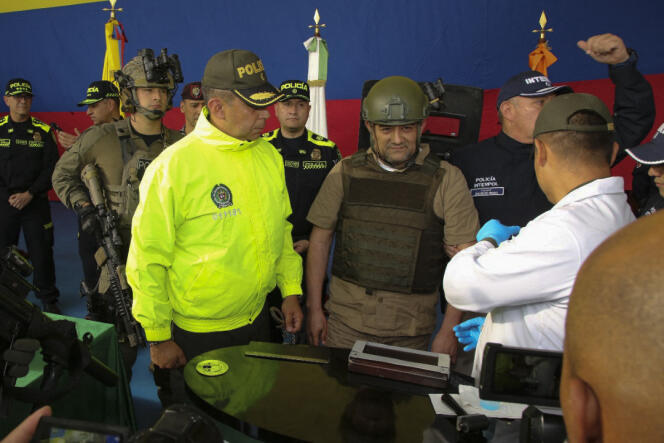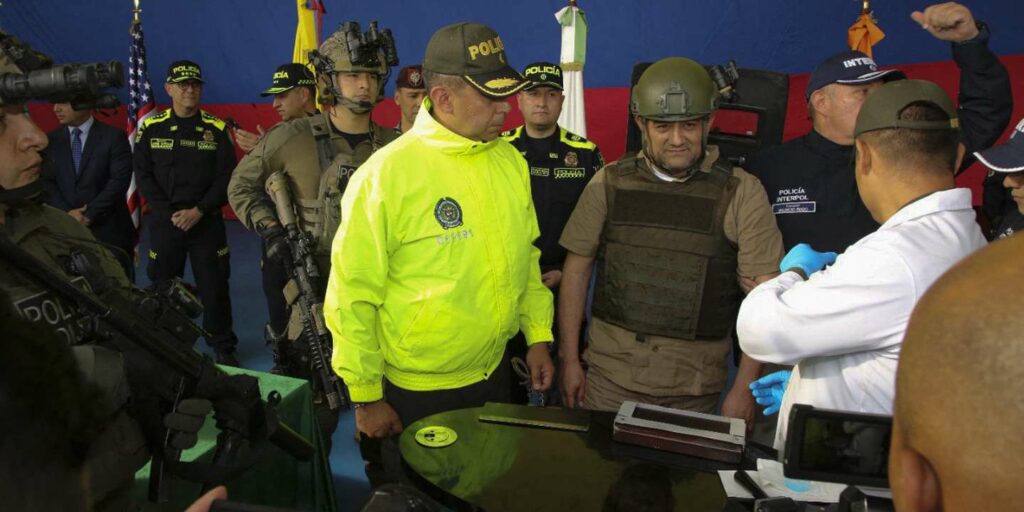
Three federal courts await him: considered one of the biggest drug traffickers in Colombia, « Otoniel », leader of the Clan del Golfo, was extradited on Wednesday May 4 to the United States where he is being prosecuted by American justice. .
“I would like to inform that Dairo Antonio Usuga, alias “Otoniel”, has been extradited”Colombian President Ivan Duque said in the evening, on Twitterbelieving that « This criminal can only be compared to Pablo Escobar »notorious drug trafficker of the Medellin Cartel, shot dead by the police in 1993.
“He is the most dangerous drug trafficker in the world, a murderer of social leaders and police, a rapist of children and adolescents. Today, legality, the rule of law, public force and justice triumph ».
On the run for more than a decade
Colombia’s most wanted drug trafficker, « Otoniel », 50, was arrested on October 23 in the northwest of the country during a major military operation with American and British assistance. He had been on the run for more than a decade, benefiting from the largesse of corrupt state officials. He has long been on the US Federal Agency for Combating Drug Trafficking and Distribution (DEA) most wanted list and there was a $5 million bounty on his head. United States.
“Otoniel” was first charged in 2009 in Manhattan federal court with drug trafficking and providing assistance to a far-right paramilitary group designated as a terrorist organization by the US government. Later indictments in federal courts in Brooklyn and Miami charged him with importing at least 73 tons of cocaine into the United States between 2003 and 2014 via countries including Venezuela, Guatemala, Mexico, Panama. and Honduras.
On Wednesday, he was transferred – handcuffed, wearing a helmet and wearing a bulletproof vest – from a prison in Bogotá to a heavily guarded military transport airfield. Local media broadcast images of a convoy of large armored vehicles, escorted by heavily armed police. The presidency also published photos of « Otoniel », handcuffed, on board a jet, shortly before the aircraft took off.
Relatives of the victims of « Otoniel » had requested a suspension of the extradition, believing that this procedure was going « to remove from justice a paramilitary leader who has committed crimes against humanity [en Colombie] », and which is the subject of more than 128 lawsuits in the country. They invoked their right to know the truth and to receive reparations. But the Colombian justice finally gave its authorization to the extradition of the drug trafficker, explained to Agence France-Presse (AFP) the defense team of Mr. Usuga.
Mr. Duque said that, from the United States, the drug trafficker would continue to collaborate with the Colombian authorities in the investigations against him and that, when he had served his sentences, he would return to « Colombia to pay for all the crimes he has committed there ». Mr. Duque has « thanked » the Supreme Court, the Council of State as well as the Special Jurisdiction for Peace (JEP, which investigates the armed conflict in Colombia) « for having avoided the intentional manipulations of this criminal in an attempt to avoid this extradition ».
Incidents and controversies
The detention under close surveillance in Bogota of “Otoniel” was marked by several incidents and controversies. Recordings of his testimony before the truth commission, a body that investigates human rights violations during the armed conflict in Colombia until the signing of the 2016 peace agreement, have been stolen by unknown persons. Colombian police also interrupted a hearing for « Otoniel », saying they suspected an escape attempt.
« Who’s Afraid of ‘Otoniel' »had in particular titled the independent online media Cambiobelieving that some wanted to silence the drug trafficker, who allegedly declared during his hearings that the army continued to work in complicity with far-right paramilitaries in certain regions of the country.
According to the press, citing a JEP document, « Otoniel » allegedly implicated sixty-three people, allegedly linked to the Golfo Clan, including a former minister, a former national director of the intelligence services, six former governors and four former members of parliament. According to his lawyers, he also claimed to have organized his surrender.
Coming from a peasant family in northwestern Colombia, Mr. Usuga was a far-left guerrilla, then a far-right paramilitary, before becoming the head of a strong drug trafficking organization. about 1,600 men, who exported an average of nearly 300 tons of cocaine each year to around 30 countries, according to the authorities. He succeeded as head of the Clan del Golfo to his brother, Juan de Dios, known as « Giovanni », killed by the police in 2012.
In five decades of war against drugs supported by the United States, Colombia has killed or captured several drug traffickers, the best known to the general public being Pablo Escobar. But the country remains the world’s largest producer of cocaine and the United States the main market, while violence linked to trafficking continues.

